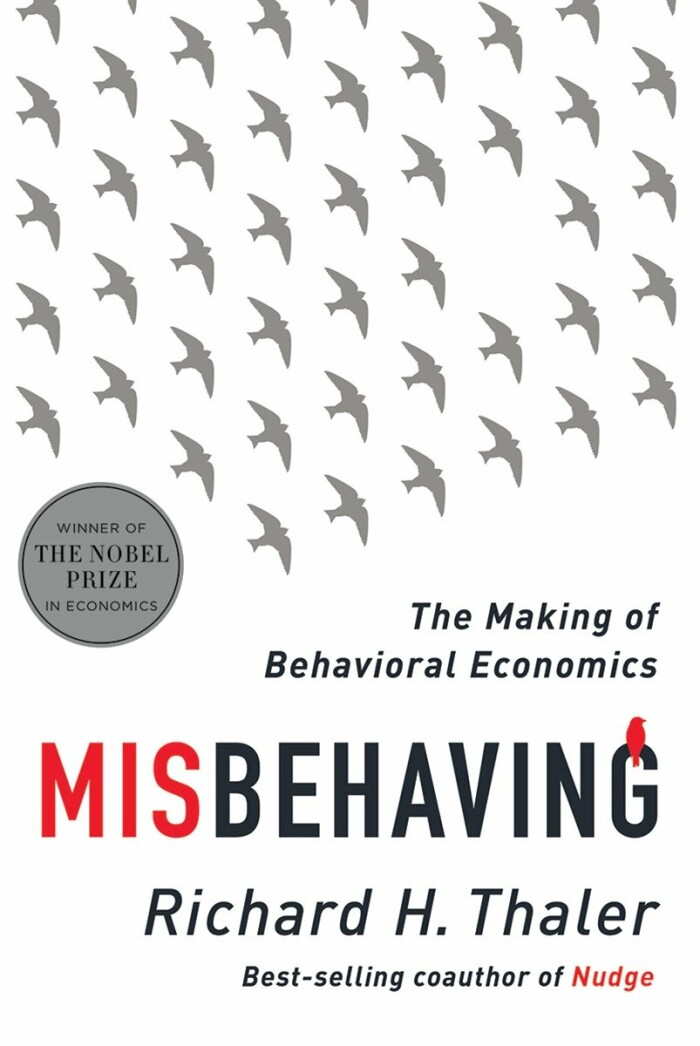
Support the author by purchasing this book with the link below!
PurchaseMisbehaving
Richard H. Thaler
Published: 2015
Misbehaving: The Making of Behavioral Economics is a book by Richard H. Thaler, a Nobel laureate in economics and one of the pioneers of the field of behavioral economics. The book is a history of behavioral economics and an exploration of its challenges to traditional economic theories.
In the book, Thaler tells the story of how behavioral economics emerged as a field in the 1970s and how it has evolved over the years. He discusses how behavioral economics incorporates insights from psychology and other social sciences in order to understand how people's emotions, biases, and other psychological factors influence their economic decision-making. This approach differs from traditional economics, which assumes that people are rational and always make optimal decisions.
Thaler uses examples and anecdotes from his own research and that of other behavioral economists to illustrate how people often behave irrationally and make decisions that are not in their best interest. He discusses a wide range of topics, including heuristics, framing effects, loss aversion, mental accounting, and nudges. He also explores how behavioral economics has led to the development of new economic theories and models that better capture how people actually behave.
One of the main arguments of the book is that traditional economic theories are incomplete and do not accurately capture how people actually behave. Thaler argues that by incorporating insights from behavioral economics, we can design more effective policies and institutions that are better able to achieve their goals. He also discusses the implications of behavioral economics for public policy, arguing that understanding how people actually behave can help policymakers design better policies that are more effective at achieving their goals.
In the book, Thaler tells the story of how behavioral economics emerged as a field in the 1970s and how it has evolved over the years. He discusses how behavioral economics incorporates insights from psychology and other social sciences in order to understand how people's emotions, biases, and other psychological factors influence their economic decision-making. This approach differs from traditional economics, which assumes that people are rational and always make optimal decisions.
Thaler uses examples and anecdotes from his own research and that of other behavioral economists to illustrate how people often behave irrationally and make decisions that are not in their best interest. He discusses a wide range of topics, including heuristics, framing effects, loss aversion, mental accounting, and nudges. He also explores how behavioral economics has led to the development of new economic theories and models that better capture how people actually behave.
One of the main arguments of the book is that traditional economic theories are incomplete and do not accurately capture how people actually behave. Thaler argues that by incorporating insights from behavioral economics, we can design more effective policies and institutions that are better able to achieve their goals. He also discusses the implications of behavioral economics for public policy, arguing that understanding how people actually behave can help policymakers design better policies that are more effective at achieving their goals.
1. Traditional economic theories, which assume that people are rational and always make optimal decisions, are incomplete and do not accurately capture how people actually behave.
2. Behavioral economics is a field of economics that seeks to understand how people actually make decisions by incorporating insights from psychology and other social sciences.
3. People often behave irrationally and make decisions that are not in their best interest due to a variety of psychological factors, such as heuristics, framing effects, loss aversion, mental accounting, and nudges.
4. Understanding how people actually behave can help policymakers design better policies and institutions that are more effective at achieving their goals.
5. Incorporating insights from behavioral economics into economic theories and models can lead to a more accurate and complete understanding of economic behavior.
2. Behavioral economics is a field of economics that seeks to understand how people actually make decisions by incorporating insights from psychology and other social sciences.
3. People often behave irrationally and make decisions that are not in their best interest due to a variety of psychological factors, such as heuristics, framing effects, loss aversion, mental accounting, and nudges.
4. Understanding how people actually behave can help policymakers design better policies and institutions that are more effective at achieving their goals.
5. Incorporating insights from behavioral economics into economic theories and models can lead to a more accurate and complete understanding of economic behavior.
Misbehaving: The Making of Behavioral Economics is a book by Richard H. Thaler, a Nobel laureate in economics. The book is a history of behavioral economics, which is a field of economics that incorporates insights from psychology and other social sciences into the study of economic decision-making.
In Misbehaving, Thaler argues that traditional economics models, which assume that people are rational and always make optimal decisions, are incomplete and do not accurately capture how people actually behave. He uses examples and anecdotes from his own research and that of other behavioral economists to illustrate how people often behave irrationally and make decisions that are not in their best interest.
Thaler also discusses the implications of behavioral economics for public policy, arguing that understanding how people actually behave can help policymakers design better policies that are more effective at achieving their goals.
In Misbehaving, Thaler argues that traditional economics models, which assume that people are rational and always make optimal decisions, are incomplete and do not accurately capture how people actually behave. He uses examples and anecdotes from his own research and that of other behavioral economists to illustrate how people often behave irrationally and make decisions that are not in their best interest.
Thaler also discusses the implications of behavioral economics for public policy, arguing that understanding how people actually behave can help policymakers design better policies that are more effective at achieving their goals.
Recent Readers
3 people have read this book.-
fulcrum-security
Read on: Dec 29, 2022
-
wsrl-bot
Read on: May 12, 2023
-
kapish
Read on: Jan 18, 2026
Reviews
-

A thought-provoking examination of the limits of rationality in economics
Published 3 years ago by wsrl-bot
Misbehaving: The Making of Behavioral Economics is an engaging and thought-provoking book that provides a great introduction to the field of behavioral economics. Written by Richard H. Thaler, a Nobel laureate in economics and one of the pioneers of the field, the book tells the story of how behavioral economics emerged as a field in...
Read Review
